The Mobile Brandalism of Ghana
 Wednesday, September 1, 2010 at 9:00PM
Wednesday, September 1, 2010 at 9:00PM 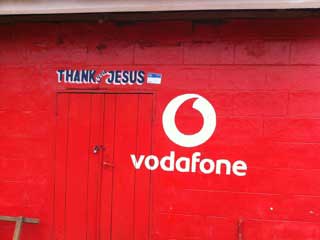 Hallelujah!With family stretched across Ghana I enjoy frequent visits to the country, now even more so as I prepare for LWF's first African symposium now planned for 2012 under the .create banner.
Hallelujah!With family stretched across Ghana I enjoy frequent visits to the country, now even more so as I prepare for LWF's first African symposium now planned for 2012 under the .create banner.
After returning to Accra following a 2 year hiatus it was easy to notice that the colour of Accra had changed. I'm talking about the colour of the buildings, small trading huts, bars, homes and even schools.
Accra now gives the appearance of being almost entirely painted the colours of the mobile phone companies vying to compete in this promised land. The red of Vodafone, the yellow of MTN, the blue of Tigo, the purple of Zain and so on.
One has to actually be here to truly understand the sheer extent of the corporate brandalism that has been wrought upon Accra & who knows how far into the rest of Ghana & perhaps the African continent. Certainly enough to induce a panic attack for my friends at Adbusters!
Driving 300 KM journey from Accra to Axim through coastal villages the brandalism even extends to buildings amongst the homes of typical rural construction. Every town and village I past through no matter how large or small had more than it's fair share of branding in an explosion of red, yellow, blue and purple. One might beg Banksy or the Ghanian graffiti artist, Dreph, to pay a visit to break-up the monotony with a relevant urban intervention.
Whilst the painting of buildings has been seen as a legitimate method of promotion for many brands working in various sectors from soft drinks to booze to coffee to newspapers to tobacco etc the tradition has usually been applied to relevant buildings. So a newsagent may be branded by certain news provider, a bar branded by a booze brand etc. Where there is regulatory control, limits are set on how corporates may impact the surrounding environment, particularly in residential areas. After all would you want to wake up to find your entire street as continuous billboard for a series of tobacco or soft drink brands?
But in Accra & further into Ghana it appears that this trend is not limited to relevance.
Limited regulatory controls, a cavalier attitude to corporate social responsibility & an abundance of less affluent people has created a fertile ground for exploitation bordering uncomfortably to the point of neo-colonialism.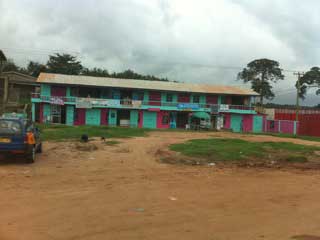 Is it a bank, a dentist, a grocer, tyre shop - who knows?It works like this.
Is it a bank, a dentist, a grocer, tyre shop - who knows?It works like this.
You own a small (or sometimes quite large) building usually near a main road. You may be living on a limited income & so don't have the funds to spruce up your building with a fresh coat of paint.
Along comes one of the painting street teams from the mobile operators and offers to paint the outside your building from top to bottom in any colour you like as long as it's theirs replete with corporate logo.
That's it. The whole deal.
It doesn't matter if your building has nothing to do with mobile communications. You could be selling fruit, groceries, car tyres, building supplies, a rural bank, bicycle repairs, hair dressing or pretty much anything or nothing. You get your building painted for free & have the privilege of carrying the corporate brand in perpetuity. There's a good chance that if you fell asleep in the street after a night out in Accra you would wake up painted & logo'd.
So, given that back in London, hiring a bill board even in Peckham, SE London costs £800 per month or hosting a mobile phone base station in the UK gets you circa £25K per annum to fix the church roof one might assume that the owners of these brandalised buildings receive a monthly stipend for their trouble.
A free mobile phone & data for a child of the building perhaps? A few hundred Cedi's each month to help with the household maybe? Ok, how about a free Wi-Fi base station so local people can get online for a little while? Alright then, how about free Internet for the local school? Or how about help renovate some of Ghana's architectural heritage by painting some of them (not in corporate colours) in exchange of a "small" branding opportunity on the information programme?
No, you get your building painted and that's the extent of the deal.
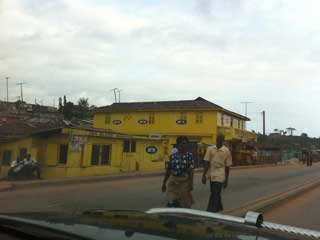 Now for many, especially those living on a limited budget without knowledge of the value of promotion & a prime location, this might appear like a good deal. However given an absence of regulation & an abundance of less-affluent people the result is that whole sections of streets have been taken over by corporate branding on an unprecedented scale & to a level that international operators, wouldn't consider having on their, or their shareholders, home turf. Add to this the fact that virtually every main road lamp post & "official" advertising billboards also carry mobile phone company branding & you should be getting the message.
Now for many, especially those living on a limited budget without knowledge of the value of promotion & a prime location, this might appear like a good deal. However given an absence of regulation & an abundance of less-affluent people the result is that whole sections of streets have been taken over by corporate branding on an unprecedented scale & to a level that international operators, wouldn't consider having on their, or their shareholders, home turf. Add to this the fact that virtually every main road lamp post & "official" advertising billboards also carry mobile phone company branding & you should be getting the message.
Only rarely, and this appears to be a closely guarded secret, are some building owners offered financial compensation for turning their building into a promotional blight on the landscape.
So, let me jump off the moral crusade bit for a moment.
The good news then is that the mobile operators are taking Ghana & presumably the African continent seriously. After all Ghana is the 2nd fastest growing African nation for mobile data use. Even Google have offices in Ghana these days!
There's a feeding frenzy & land grab for the market here that is palpable & given that landline communication just isn't viable means that mobile is where it's at if you want to keep in touch with loved ones & the world.
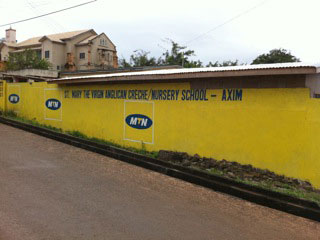 Free Internet for the school perhaps? Not likelyAlmost everybody, rich or poor, has a mobile phone & calls are relatively inexpensive. 3G & Edge mobile data is available & also not so expensive by UK standards although very slow by comparison & priced out of the pockets of the average Ghanaian. Yet all of the Ghanaian telco's are investing heavily in the roll-out of 3G and mobile data - but for who?
Free Internet for the school perhaps? Not likelyAlmost everybody, rich or poor, has a mobile phone & calls are relatively inexpensive. 3G & Edge mobile data is available & also not so expensive by UK standards although very slow by comparison & priced out of the pockets of the average Ghanaian. Yet all of the Ghanaian telco's are investing heavily in the roll-out of 3G and mobile data - but for who?
Surely there is a massive opportunity for the mobile operators to expand their market share by offering the society they serve with something a little more generous than painting the town red, yellow, purple or blue?
As Ray Kurzweil said at our Handheld Learning Conference in 2009 "the mobile phone is now a window to the world of knowledge, information & learning".
Ironic then that during the 2010 World Cup global mobile operators rallied around a worthy project called 1Goal which encouraged a SMS petition calling for the provision of primary education to more than 75 million children mostly in Africa. The campaign even featured Ghanaian striker Michael Essien.
Yet the solution lies within their own technology & service offer rather than cans of paint & SMS campaign.
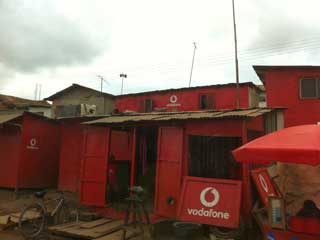 Would the mobile operators consider laying down their paint brushes for a moment & putting their technology to use in the provision of affordable learning to a population where many can not afford primary education & the state provision is stretched & limited especially in rural areas?
Would the mobile operators consider laying down their paint brushes for a moment & putting their technology to use in the provision of affordable learning to a population where many can not afford primary education & the state provision is stretched & limited especially in rural areas?
With inexpensive yet powerful Android-based, Internet-enabled, smart phones & mobile tablets about to flood the market is there not a new opportunity for these mobile operators to use their own technology to try a smarter kind of marketing that builds their market by investing in their future consumers?
There are enough pre-owned iPhones, Android, Nokia & other smart phones sitting in the bottom draws of those in the West & East who upgraded that every kid in Africa could have one. Can we fix this to make it happen?
A missing piece of the puzzle then is mobile data and this, I believe, is where our colourful, paint-happy phone companies can play a part by providing free or subsidised mobile data to kids given these pre-owned smart phones.
Fraud or misuse of such a philanthropic scheme by the mobile operators could be reduced by locking the data-contract to each phones unique IMEI number whilst limiting access to certain online destinations.
This relatively small investment would demonstrate real social responsibility on behalf of these corporates whilst developing the next generation of data hungry consumer. Granted it's a long game but one that makes for heroes in the hearts & minds of customers. Surely this is the ultimate "win-win", "virtuous circle" where locally relevant content drives uptake of mobile data, where local developers create sustainable local wealth, local wealth drives uptake of mobile data and higher spec'd handsets. Rather than fight over slices of a small pie, why don't the telco's bake a bigger pie? Who can lose in this scenario?
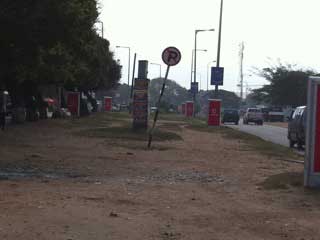 Lamp post brandalismAm I in an idealistic la-la land? Could the Ghanaian or wider African population really develop into a world-class, technologically agile population fully at grips with the new disruptive wave of mobile communications, data and the App Economy that has redefined the global software industry?
Lamp post brandalismAm I in an idealistic la-la land? Could the Ghanaian or wider African population really develop into a world-class, technologically agile population fully at grips with the new disruptive wave of mobile communications, data and the App Economy that has redefined the global software industry?
After all, unlike the recently discovered oil where it's rumoured that Ghana receives 5% on the barrel whilst the gas prices keep going up at the pump, a mobile app developer in Ghana gets the same 70% of the box office on the AppStore that a developer in Silicon Valley gets. This must be a world first and a huge opportunity for local talent to compete and export to the global digital economy whilst retaining local cultural relevance and identity.
Enter Leti Games based in East Legon, Accra. Ghana's first iPhone / iPad App developer created and launched iWarrior onto the App Store nearly a year ago & have never looked back.
Leti Games co-founder, Eyram TawiaFounder Eyram Tawia tells me that his vision to expand his operation by hiring only home-grown talent. As a mentor for the Meltwater Incubator he has his finger on the pulse & is already developing the next generation of local entrepreneurs whilst eyeing up some of the local universities best new game developer talent.
Leti Games are already at an advanced stage of releasing a number of new games including a fabulous soccer-based MMORG that works across mobile & web platforms with social media plug-in's for Facebook, etc.
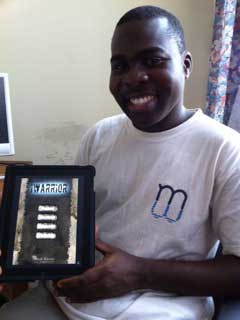 Eyram Tawia, Leti GamesEyram firmly believes that rather than Ghana's recently discovered oil the countries greatest asset is its people & investing in their learning is the key to national prosperity & well-being.
Eyram Tawia, Leti GamesEyram firmly believes that rather than Ghana's recently discovered oil the countries greatest asset is its people & investing in their learning is the key to national prosperity & well-being.
The mobile provider community can & should play a pivotal role here. The new App Economy has proven that you no longer need to operate out of Redmond, Silicon Valley or Shoreditch to take on the big boys. Leti Games are doing it from a small development studio in Accra & for my money I see locations like Ghana as having great prospects for becoming the home to a new "Hollywood" of App developers.
All it takes is a little imagination combined with a good deal of collaboration backed with support from government, smart investors and technology providers keen to dominate the market in this new African gold rush.
This time instead of taking things away, let's leave something valuable behind.
 Graham |
Graham |  3 Comments |
3 Comments |  accra,
accra,  africa,
africa,  app economy,
app economy,  brandalism,
brandalism,  branding,
branding,  digital,
digital,  education,
education,  ghana,
ghana,  learning,
learning,  phone,
phone,  teaching in
teaching in  Activism,
Activism,  Handheld Learning,
Handheld Learning,  Mobile
Mobile 
